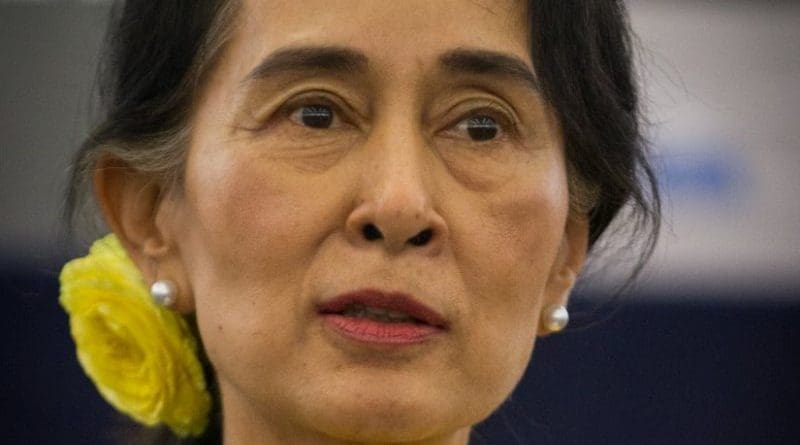Burma: Suu Kyi Treads Fine Line On Rohingya Tragedy
By UCA News
By John Zaw and Michael Sainsbury
Faced with a powerful military keen to have martial law declared in Rakhine State where there has been an exodus of nearly a half-million people in three weeks, Myanmar’s leader, State Counselor Aug San Suu Kyi avoided any mention of ethnic cleansing of Muslim Rohingya while broadly condemning human rights violations in her first major address on the issue.
“We condemn all human rights violations and unlawful violence,” Suu Kyi said. “We are committed to the restoration of peace, stability and rule of law throughout the state.”
More than 410,000 Rohingya have fled to Bangladesh since Aug. 25 when the Arakan Rohingya Salvation Army attacked police posts and an army base that led to military clearance operations in the conflict-stricken region. Calling out the group as terrorists was the only time Suu Kyi used the word Rohingya.
The half-hour address, delivered with her usual charm, was greeted with either muted praise or dismissal by western governments, Muslim nations and aid groups.
“While it was positive to hear Aung San Suu Kyi condemn human rights violations in Rakhine State, she is still silent about the role of the security forces,” Amnesty International said.
The speech was welcomed by China, as well as local Myanmar citizens in Yangon and other cities where they cheered her on.
In her speech, Suu Kyi explained how Myanmar could assist Rohingya refugees in Bangladesh willing to return to Rakhine.
“We are prepared to start a refugee verification process for those who wish to return,” Sui Kyi said.
She added those verified as refugees will be accepted without any problem and have full assurance of security and access to humanitarian aid, referred to in a 1993 principle agreed between Bangladesh and Myanmar.
That process earlier saw 200,000 Rohingya refugees return yet it also saw tens of thousands being left behind in Bangladesh, unable to produce sufficient documentation to pass through the process that was run by the United Nations High Commissioner for Refugees and later held up as a textbook triumph for that organization.
Kyaw Min, chairman of Yangon-based Rohingya party-the Democracy and Human Rights, said it would be difficult for refugees to show documents of their status from Myanmar because they fled for their lives in awful conditions.
“Thousands of Rohingya who fled Rakhine State due to fear actually want to come back but it is up to the government on how willing they are to accept them,” Kyaw Min told ucanews.com.
Nyan Win, a central executive committee of the ruling National League for Democracy party, said as there are thousands of refugees in Bangladesh they need documents of their refugee status from Myanmar to accept them.
“The process will be taken with a step by step by collaboration between the government of Myanmar and Bangladesh,” Nyan Win told ucanews.com.
Kyaw Nyein, a Yangon-based non-Rohingya Muslim leader and a lawyer, sees it is a positive move by Suu Kyi’s government but there are other issues that need to be addressed, mainly the 1982 citizenship law which effectively makes the Rohingya stateless.
“What I understand is that verification for refugees status as per the 1993 principle is the effort of solving the problem politically between Myanmar and Bangladesh governments. But the government of Myanmar will stick to the controversial 1982 citizenship law,” Kyaw Nyein told ucanews.com.
Kofi Annan’s Rakhine Advisory Commission recommended last month for an acceleration of the national verification process and a revisit of the 1982 citizenship law.
A group of political parties, led by the Union Solidity and Democracy Party, the political arm of the military, known as the Tatmadaw, has called for martial law to be declared in northern Rakhine. So far Suu Kyi has resisted but reports in Mynamar have said there is fresh pressure on President U Htin Kyaw to convene a meeting of the 11-member National Defence and Security Council (NSDC).
“The Tatmadaw wants the NSDC, on which it controls six seats, to exercise its authority to declare a state of emergency in northern Rakhine and place the area under martial law,” the English language Frontier Myanmar wrote.
During her speech she made a direct appeal to international diplomats to “join us” and help Myanmar find a lasting solution to all the conflicts and the raft of other problems that continue to roil the largely impoverished nation.
Following the speech she held a two-hour closed-door meeting with international diplomats who she has invited to visit Rakhine provided security is deemed to be sufficient to “see for yourselves.”

